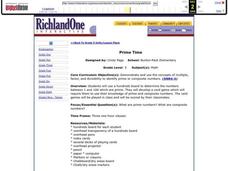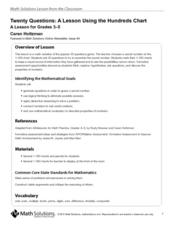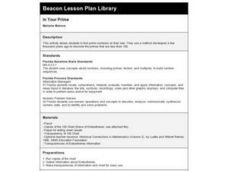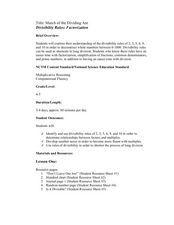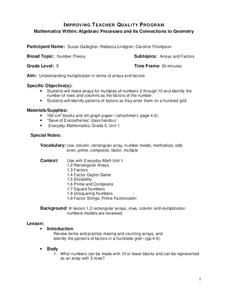Curated OER
Time for Prime
Explore prime numbers. Learners use an interactive 100's chart to identify prime numbers, discuss a glossary of terms, use cards to list multiples of 2,3,4,5, and play a bingo game.
Curated OER
Prime and Composite Numbers - Kenwood Academy
Learners investigate prime and composite numbers. They use a number chart and cross out multiples of 2,3,5 etc. up to 100. Pupils fold pieces of masking tape around pennies and label them with composite numbers, then fold masking tape...
Curated OER
Prime Real Estate
Young scholars analyze and discuss prime numbers and the Sieve of Eratosthenes, a procedure to sort out prime numbers. They identify the prime numbers from 1-100 by eliminating all the multiples of the first four prime numbers, and...
Curated OER
Prime Time
Fifth graders complete activities related to prime and composite numbers. In this prime lesson, 5th graders make a hundreds chart with all the prime numbers. They create their own card game which deals with prime and composite...
Curated OER
Twenty Questions: The Hundred Chart
Use the 20 Questions game to practice math vocabulary and number properties! Project a hundreds chart and hand one out to learners. Ideally, give them counters (beans would work well) to mark off the chart so you can play multiple times....
Curated OER
In Your Prime
Young scholars study how to find prime numbers. They investigate the teachings of the mathematician Eratosthenes and apply his theory of prime numbers less than 100.
Curated OER
Prime and Composite Numbers
Fifth graders use prime factorization to identify prime and composite numbers. They use cubes to find factors. In groups, 5th graders draw rectangular arrays to discover prime numbers under 100.
Curated OER
Prime and Composite Numbers
Sixth graders identify prime and composite numbers and complete an activity problem. Given a 100 chart, they follow directions to create a prime number chart. In groups, 6th graders play a "Prime Take Away" activity to reinforce prime...
Curated OER
March of the Dividing Ant
Students inspect divisibility rules. In this divisibility rules lesson, students study the relationship between factorization and the divisibility rules for 2, 3, 5, 6, 9, and 10. Students read One Hundred Hungry Ants and A Remainder of...
Curated OER
Mathematics Within: Algebraic Processes and Its Connections to Geometry
Fifth graders discover the connections between algebra and geometry. With a focus on arrays and factors, they are introduced to multiplication. They develop an array for multiples of 2 through 10 and identify the factors of each row....



